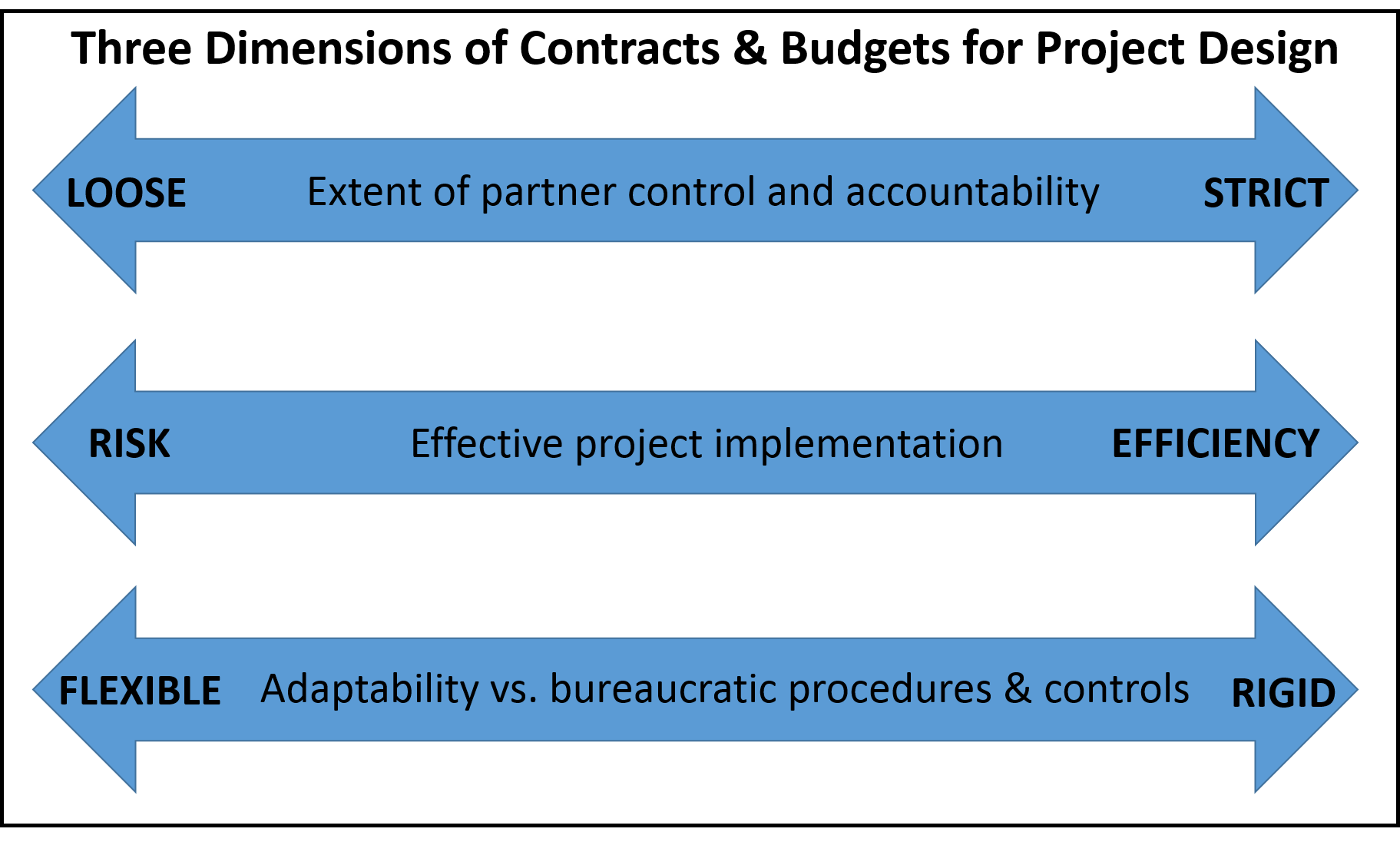Dave Kraybill, Jim Foreman, and Daniel Yahba
Edited by Keith M. Moore
Contractual mechanisms and associated budgets provide the framework for project implementation. This is important for stability and control, but often limits options for effective project implementation. Furthermore, not everyone sees this foundation in the same light. Donors, implementers, and host institutions have differing interests and priorities. Identifying the proper balance for all parties is important for making progress toward achieving project objectives.
In order to better grasp the issues involved, we examine the following set of trade-offs. One can imagine a continuum with three dimensions of variation:
- extent of partner control and accountability;
- risk versus efficiency of project implementation; and
- adaptability versus bureaucratic procedures and controls.
 Each dimension variously impacts the contributions of donors, implementers, and host institutions and the overall effectiveness of project management.
Each dimension variously impacts the contributions of donors, implementers, and host institutions and the overall effectiveness of project management.
Extent of Partner Control and Accountability
Project initiation is a defining moment for the success of any project. At the outset of most projects, host institution involvement is minimal. Donor competitive processes offer limited opportunities for engagement between implementers and host institutions. Donors set project objectives and the scale of activities to achieve them. In some cases, high level officials representing host institutions may be involved, but not those who will be responsible for day-to-day administration; in other cases, individuals may be engaged, but institutional linkages for partnering are ignored. This is significant because contracts set the terms for future engagement around specified objectives within a particular budgetary framework. In addition, this determines the degree of transparency of project partners’ actions.
Once the initial contractual terms are established it is often very difficult to make more than marginal changes. Implementers propose and implement a plan for how they will achieve project objectives and document their achievement. They, too, set out contractual parameters for implementation and accountability cementing in place the implementer/host institution relationship. To whom ultimate accountability is owed determines the distribution of control between partners.
Standard project design procedures have had impacts at the host institution level:
- a lack of commitment of targeted beneficiaries to the specified objectives;
- poor linkage between objectives and institutional needs; and
- little recognition of the preconditions for project success.
These procedures have impacts for the implementer as well:
- limits the range of partnership modalities between implementer and host institution; and
- constrains the ability to make mid-course corrections as obstacles to project success are encountered.
Risk versus Efficiency of Project Implementation
Within these contractual parameters, the trade-offs for project management involve the degree of risk each partner is willing to expose themselves to and the efficiency with which project objectives can be achieved. Perhaps one of the most common statements that host country researchers have made over the years is that they would prefer funds be directly given to them or that the implementer make the purchases. Indeed, conventional project wisdom dictates not passing funds through the host institution. The management of project funds is at the same time a major implementation challenge and the precondition for sustainable project impacts. Two fundamental questions are posed for implementers:
- Are there adequate controls in place within the host institution (as stipulated in contract language) to transparently manage project funds?
- Can project expenditures be efficiently and effectively managed to ensure the timely achievement of project objectives?
Many implementers have found it most cost effective and efficient to manage the funds themselves. For host institutions, this lack of transparency can become the source of aggravation when project expectations are not met. Alternatively, some implementers have made major cash advances to host institutions to be recovered on a cost-reimbursable basis. Limited devolution of funds management when the scale of activities is restricted has met with mixed results. Shifting the burden for transparency to the host institution would seem appropriate. Effective financial management of project funds by host institutions is a function of inherent administrative and technical capacity to manage funds. However, host institutions face challenges in following contractual procedures often buried in the fine print (in legal English) of implementer/host institution contracts and the alien nature of donor accountability requirements.
Adaptability versus Bureaucratic Procedures and Controls
Adaptive management and project learning have long been the standard for good project implementation. However, contractual mechanisms, budgets, and bureaucratic procedures create challenges for project flexibility. These challenges promote recourse to short-cuts and unsustainable practices to achieve project objectives and demonstrate success before end-of-project.
Innovative Approaches
Confronted with these challenges, our projects have attempted the following innovations with varied success:
- Designed contracts with open-ended, ‘to be mutually determined’ objectives.
- Promoted organizational experiments for testing institutional innovations.
- Replaced cost reimbursable contracts with fixed obligation grants.
- Implemented administrative and financial management training programs.
- Defined a set of financial performance targets.
What contract and budget innovations have you tried or would like to see attempted to address these issues in project design?

